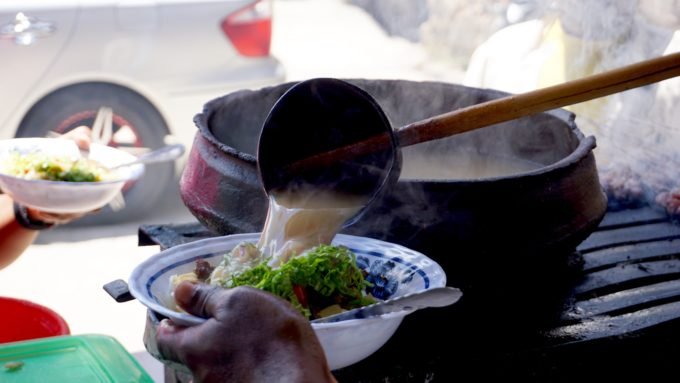
The Sweat‑Out‑Your‑Sins Power of Meaty, Starchy Stew

The Sweat‑Out‑Your‑Sins Power of Meaty, Starchy Stew
Urojo in Zanzibar
My first taste of urojo (“oo-row-jo”) was out of necessity. After a stint in Mombasa, Kenya, where I work for an NGO focusing on early childhood development, I was sent to Zanzibar, where I jumped, wallet-first, into the island’s flavors and cocktail hours. After three weeks of hedonistic bliss, I was happy, hungover, and heinously over-budget, and the 2000 Tanzanian shilling (US$1) urojo stand around the corner from our Stone Town offices had never been more enticing.
My guide was a local colleague, Adi. The stand was in an open corner of a concrete building, under a corrugated iron roof, looking out onto a dirt parking lot. With communal cups, ceramic bowls, stone benches, and flies buzzing incessantly, it didn’t look promising. But Adi swore by the sweat-out-your-sins power of urojo, and he ordered for both of us. Bakuli mbili, nyama zaidi. Two bowls, extra meat. So we waited patiently, not a single tourist in sight, until our steaming bowls arrived.
Drawing on Arab, Indian, and African influences, Swahili cuisine reflects centuries of cultural exchange and spice-trading along the East African coastline. Assembling urojo begins with the starches: a steamed potato cut in quarters, a pair of daal vada (lentil donuts) crumbled by hand, and a sprinkling of sev (crispy, chickpea-flour noodles). Next comes a medium-boiled egg, halved, followed by chopped tomatoes, onions, and cucumbers, and heaps of basil and romaine lettuce. The mutton mishkaki (skewers) are then pulled hot off the sticks, glistening with juices. From a large pot on the stove, turmeric-yellow urojo stock is ladled out by the bowlful.
If you can keep your spoon holstered long enough for the various elements of the urojo to mix, the flavors become more complex. The potatoes and egg yolk slowly dissolve into the stock, thickening it. The vada softens and swims in the flavors around it. And somehow, each bite has a flash of cucumber , an unexpected freshness that cuts through the island heat and pairs perfectly with the tender morsels of mishkaki.
There are a few meals that you simply never forget. Between each bite you try, desperately, to slow down time, memorize the nuances—and plot your next visit. Months later, I’m still dreaming of that first taste.